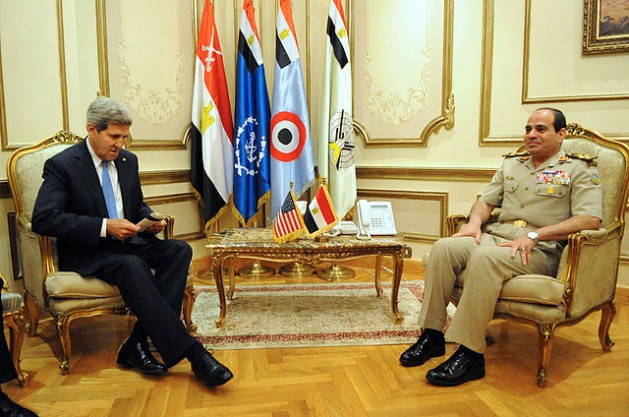By Kitty Stapp | – –
NEW YORK (IPS) – The Egyptian government is holding a record number of journalists in jail, a press freedom group said Thursday, despite promises to improve media freedoms in the country.
U.S. Secretary of State John Kerry meets then Egyptian Minister of Defence General Abdul Fatah Khalil al-Sisi in Cairo, Egypt, on November 3, 2013. Credit: U.S. Department of State
A prison census conducted by the New York-based Committee to Protect Journalists (CPJ) at the start of this month found that Egyptian authorities were currently detaining at least 18 journalists in connection with their work. This is the highest number since CPJ began recording data on imprisoned journalists in 1990.
“The al-Sisi government is acting as though to restore stability Egypt needs a dose of repression the likes of which it hasn’t seen for decades, but its treatment is killing the patient.” — Joe Stork of HRW
The group says that the government led by President Abdelfattah el-Sisi, who won nearly uncontested elections in May 2014, has used the pretext of national security to crack down on human rights, including press freedom.
The United States remains the country’s largest benefactor. Although the Barack Obama administration sent a critical report on Egypt to Congress last month, it still recommended that Washington continue sending 1.3 billion dollars in mostly military aid.
Asked whether the U.S. should use this aid as leverage to demand reforms, Sherif Mansour, CPJ’s programme coordinator for the Middle East and North Africa, told IPS, “We would like international policy makers and institutions to insist on respect for press freedom and the complete end to ongoing censorship as conditions for bilateral and multilateral support.
“They also should speak out against ongoing press violations in both public statements and private communications with the Egyptian government.”
In an ominous sign that authorities are increasingly focusing on the internet to quash dissent, more than half of the jailed journalists worked online.
Six of the journalists in CPJ’s census were sentenced to life in prison in a mass trial of 51 defendants.
Several others are being held in pretrial detention, and have not had a date set for a court hearing. One of those is Mahmoud Abou-Zeid, who was arrested in August 2013 while taking photographs of the violent dispersal of a sit-in in support of deposed president Mohamed Morsi, in which hundreds of Islamists were killed. He has been in pre-trial detention since then and has not been formally charged.
According to Human Rights Watch (HRW), a primary weapon in the crackdown is the “terrorist entities” decree issued on Nov. 26. It defines “terrorist” in extraordinarily broad terms: in addition to language about violence and threats of violence, the law covers any offence that in the view of authorities “harms national unity” or the environment or natural resources, or impedes work of public officials or application of the constitution or laws.
A “terrorist” is anyone who supports such an entity – support that can include “providing information.”
Foreign reporters have also been targeted. A year ago, on June 23, 2014, an Egyptian court convicted three Al Jazeera journalists and 15 others for their alleged association with the outlawed Muslim Brotherhood.
While the White House complained at the time that the verdict “flouts the most basic standards of media freedom and represents a blow to democratic progress in Egypt,” it did not cut off aid.
The three Al-Jazeera journalists, all of whom had previously worked for mainstream international news media, were Egyptian-Canadian Mohamed Fahmy, Australian Peter Greste, and Egyptian Baher Mohamed.
They were detained after a raid on their studio in the Marriott Hotel in Cairo and charged with membership in the Muslim Brotherhood and fabricating video footage to “give the appearance Egypt is in a civil war.” The three were initially sentenced to seven years in a maximum-security prison, with an additional three years for Mohamed for possessing a spent shell he kept as a souvenir.
Other defendants, mostly students, were accused of aiding the reporters in allegedly fabricating the footage. While two were acquitted, most were sentenced to seven years in prison; those tried in absentia were sentenced to 10 years.
Fahmy, Greste and Mohamed are finally out of prison, though Fahmy and Mohamed still face a new trial on the same charges of supporting the “terrorist” Muslim Brotherhood.
“The trial was a complete sham,” according to Philip Luther, director of the Middle East and North Africa at Amnesty International.
In a scathing report issued on March 6, HRW marked al-Sisi’s first year in power by noting that arbitrary and politically motivated arrests have soared since al-Sisi, then defence minister, seized power in July 2013 from Egypt’s first democratically elected president, Mohamed al-Morsi.
“The al-Sisi government is acting as though to restore stability Egypt needs a dose of repression the likes of which it hasn’t seen for decades, but its treatment is killing the patient,” wrote Joe Stork, HRW’s deputy Middle East and North Africa director.
According to CPJ, the president is soon expected to sign into law a draft cybercrime bill, framed as anti-terrorism legislation, which allows law enforcement agencies to block websites and pursue heavy prison sentences against Internet users for vaguely defined crimes such as “harming social peace” and “threatening national unity.”
“The potential implications for bloggers and journalists are dire,” the group says.
The bill has been endorsed by the cabinet, and is awaiting el-Sisi’s approval to come into law.
Edited by Kanya D’Almeida
Licensed from Inter Press Service




 © 2024 All Rights Reserved
© 2024 All Rights Reserved